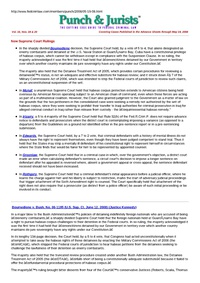Loaded on
May 1, 2008
published in Punch and Jurists
May 19, 2008
In this 7-2 decision, the Supreme Court held that defendants found mentally competent to stand trial are not necessarily also competent to represent themselves at the trial. As a result, the Court ruled that states may insist that mentally ill defendants be represented by counsel when "they are not …
Loaded on
May 1, 2008
published in Punch and Jurists
May 19, 2008
Although Walter Rothgery had never been convicted of a felony, he as arrested by Texas police in 2002 as a felon in possession of a firearm based on an erroneous California police report. Rothgery was then brought before a magistrate judge, as required by state law, for a so-called …
Loaded on
May 1, 2008
published in Punch and Jurists
May 19, 2008
Here the Court held that a circuit court's sua sponte decision to impose a longer sentence on defendant after he appealed was error under the Principle of Party Presentation, absent a government appeal or cross-appeal.
The petitioner in this case, Michael Greenlaw, was convicted of seven separate drug …
Loaded on
May 1, 2008
published in Punch and Jurists
May 19, 2008
Sentence calculation for entering the United States after having been lawfully deported following a conviction of an aggravated felony is affirmed over claims that: 1) the existence of "fast-track-programs" in some districts but not others not only created unwarranted disparities but also violated the parsimony provision of 18 U.S.C. …
Loaded on
May 1, 2008
published in Punch and Jurists
May 19, 2008
Conviction for conspiracy to commit and aiding and abetting a murder-for-hire, in violation of 18 U.S.C. § 1958, is vacated and remanded where: 1) the district court's admission of a plea allocution was plain error under Crawford; but 2) the evidence presented at trial, including the improperly admitted plea …
Loaded on
May 1, 2008
published in Punch and Jurists
May 19, 2008
In a prosecution for drug-related offenses wherein defendant entered a plea agreement, appeal of sentence is dismissed where the appeal waiver set forth in defendant's plea agreement was valid and enforceable.
[Editor's Note: For a further commentary on this decision, see "Cracked Up," by Steve Statsinger, as posted on …
Loaded on
May 1, 2008
published in Punch and Jurists
May 19, 2008
In a major blow to the Bush Administration’s policies of detaining indefinitely foreign nationals who are accused of being “enemy combatants,” a sharply divided Supreme Court held that the foreign nationals held at Guantánamo Bay have a right to pursue habeas corpus challenges to their detention in the Federal …
Loaded on
May 1, 2008
published in Punch and Jurists
May 19, 2008
In a stunning rebuff to the Bush Administration’s claimed wartime authority, the Supreme Court held that two civilian United States citizens being held in American military custody were entitled to file habeas corpus petitions, even though the U.S. military forces were acting as part of the Multi-National Force-Iraq (“MNF-I”).
…
Loaded on
May 1, 2008
published in Punch and Jurists
May 19, 2008
Rule 32(h) of the Fed.R.Crim.P. provides that “[b]efore the court may depart from the applicable sentencing range on a ground not identified for departure either in the presentence report or in a party’s prehearing submission, the court must give the parties reasonable notice that it is contemplating such a …
Loaded on
May 1, 2008
published in Punch and Jurists
May 19, 2008
Conviction and sentence for various offenses involving the distribution of controlled substances and health care fraud related to defendant's medical practices is reversed and remanded in part where: 1) under the buyer-seller rule, the lack of evidence warranted a judgment of acquittal as to a charge of conspiracy to …
